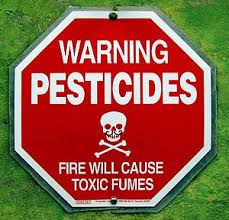 It turns out that another nasty pesticide is found in almost all of us, which we get from the foods we eat. This is the pesticide chlormequat, which is known to have harmful health effects. The use of chlormequat is on the rise in North America and Europe, where it is applied to non-organic grain crops as a plant growth regulator.
It turns out that another nasty pesticide is found in almost all of us, which we get from the foods we eat. This is the pesticide chlormequat, which is known to have harmful health effects. The use of chlormequat is on the rise in North America and Europe, where it is applied to non-organic grain crops as a plant growth regulator.
A recent study found that the percentage of persons with detectable chlormequat in their urine, as well as the levels (concentrations) of chlormequat, have been increasing yearly since 2017 (start of the study), but with a significant increase in 2023. It was found in the urine of 90% of the people tested in 2023.
This is concerning because studies find that it can reduce fertility and harm the developing fetus - even at doses lower than what regulatory agencies view as "allowable daily intake levels". Unfortunately, the CDC does not do biomonitoring of chlormequat in humans - thus it is an under the radar pesticide (found in humans, but no one is officially monitoring it).
Currently it is only allowed on ornamental plants in the US, but in 2023 the EPA proposed allowing the use of chlormequat on barley, oats, triticale, and wheat grown in the US. It is already allowed on imported grain crops from Canada and Europe. One study found it in Quaker oats and oat products, and Cheerios.
In 2020 the US EPA also raised "allowable levels" of chlormequat in food (from 10 ppm to 30 ppm), which is reflected in the study results - 90% of people tested in 2023 had detectable levels of the pesticide in their urine, and in greater amounts (concentrations) than in prior years. Once again the EPA is "looking out for us" - NOT!
Bottom line: Eat as many organic foods as possible, including oats, barley, and wheat. This pesticide is not allowed to be used on organic crops. Changing to an organic diet quickly lowers chlormequat levels in the body.
From Phys.org: New study finds little-known toxic crop chemical in four out of five people tested
A new Environmental Working Group study has found chlormequat, a little-known pesticide, in four out of five people tested. Because the chemical is linked to reproductive and developmental problems in animal studies, the findings suggest the potential for similar harm to humans. ...continue reading "Another Harmful Pesticide In Our Foods"
